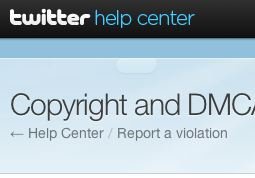Why Sending a DMCA Over a Tweet Doesn’t Make Sense
 Twitter, like most U.S.-based Web hosts, has a designated DMCA agent and, also like most hosts, received at least a few DMCA takedowns.
Twitter, like most U.S.-based Web hosts, has a designated DMCA agent and, also like most hosts, received at least a few DMCA takedowns.
I’ve also filed at least a couple with Twitter, (and can say that they have improved drastically since my first review) but only over avatars and backgrounds. I’ve never filed a DMCA notice over a tweet and, the few times I’ve been asked to, have discouraged others from doing it.
Simply put, filing a DMCA notice over a Tweet doesn’t make sense and when others do it I’m always left scratching my head. There are just better, more practical ways to deal with copyright infringement through and they require no additional effort.
Too Late to the Wrong Target
The problems with filing a takedown over a tweet are legion, but the biggest is that the length of a tweet, 140 characters max, makes it almost impossible for the tweet itself to be infringing. Short of haikus and links to outside sources, the odds of a tweet being infringing (or even qualifying for copyrightability) are slim.
But, even if you’re targeting links within tweets, it probably isn’t a wise idea. Simply put, filing a DMCA notice with Twitter is a waste of time, not because Twitter doesn’t respond effectively, because of the nature of Twitter.
Consider the following:
- The Tweet Lifecycle: Most tweets have a useful lifespan of a few minutes to, on the high side, an hour. So by the time you see a link and incur the time and expense to file the notice, it’s already off the radar.
- Wac-A-Mole: Tweets are meant to be retweeted so odds are that anything on Twitter with traction will have other copies of it out there. One would have to file a notice against all of them and, likely, keep monitoring for a while longer to be truly effective.
- Easily Reposted: If you are able to kill the only copy of a tweet, it only takes a few seconds to repost it. Even if you only spend a minute filing the notice, they can have the tweet back online in a fraction of that time.
- Little SEO Benefit: Since tweets don’t rank well in Google, there’s little danger of an old tweet appearing in relevant Google results, competing with legitimate offerings.
- It Can Blow Up Easily: Twitter is known for spreading news fast, filing a DMCA against a tweet, especially if it is at all questionable one, is a great way to experience the Streisand Effect first hand.
- The Tweet Isn’t the Problem: Most likely, you’re upset not about the content of the tweet, but a link within it. It is much more effective to deal with the target of that link rather than trying to stop every single tweet.
In short, if you file a DMCA notice over a tweet, your notice is going to arrive too late and at the wrong target. With the nature of Twitter being as it is, filing such a notice is a waste of time and, most likely, money.
There are better approaches to take.
A Better Approach
The best thing one can do if they are tempted to send such a notice is, if there is a link involved, first see what can be done about the subject of the link. In most cases, that content can be removed from the Web, thus making the entire tweet pointless. It usually doesn’t require any more time or effort but does much more to actually resolve the issue.
The simple truth is that you are not going to be able to remove every single mention of an infringement from the Web, it just isn’t practical or productive, Once you can accept that, you can then focus your energies on strategies that are practical and, with that in mind, it’s easy to see why targeting tweets isn’t a productive use of time.
That being said, if a Twitter account, possibly created by a spammer, is doing nothing but spamming out links to infringing material, it is probably wise to take some action. However, in those cases I’ve just reported the account to Twitter abuse and, for the most part, they were taken care of through that process as they are usually also violating other Twitter policies. No DMCA notice needed.
Bottom Line
All in all, one has to keep a level head when dealing with copyright on the Web and focus on being realistic and productive. Chasing down tweets that reference infringing materials is neither.
Targeting the actual infringement, not the tweet, is a better way to spend one’s energy when dealing with these matters. In fact, Twitter can actually be a useful tool for tracking infringements as following tweets relevant to your work can help you find infringements Google might have missed.
In that regard, Twitter may become as much of an ally in the fight against infringement as a foe, much like Google itself, a double-edged sword that can be put to a number of uses.
Want to Reuse or Republish this Content?
If you want to feature this article in your site, classroom or elsewhere, just let us know! We usually grant permission within 24 hours.
